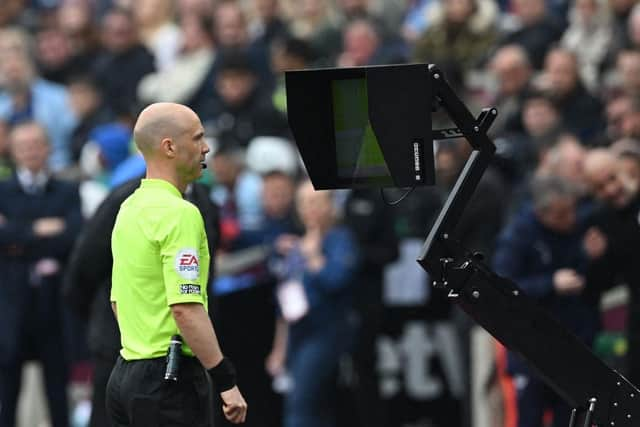How VAR is used and what decisions could be overturned during Sunderland's League One play-off final against Wycombe Wanderers
and live on Freeview channel 276
It’s the first time the video assistant referee system will be used at a game featuring the Black Cats, yet it has been used in the Premier League for the last three seasons.
Here are some of the key points for supporters ahead of the final:
How is VAR used?


Advertisement
Hide AdAdvertisement
Hide AdWhen VAR is in use, a qualified referee will watch the match with access to a number of screens and can view slow-motion replays.
That enables the video assistant referee (VAR) to advise the on-field referee if they identify a ‘clear and obvious’ error.
If the VAR feels the on-field referee could have made a ‘clear and obvious error’ the match will be paused at the next stoppage in play while the incident is reviewed.
The VAR will assess the footage using as many angles as possible, real-time replays and slow-motion replays to identify the point of contact.
Advertisement
Hide AdAdvertisement
Hide AdIf the VAR does not agree with the on-field referee’s decision they can recommend an overturn, which allows the latter to go over to a pitchside monitor and rewatch the footage from different angles themself.
After watching a replay, the on-field referee can either stick with their original decision or overturn it.
Ultimately, though, the final decision will always be made by the on-field referee.
What incidents does the VAR check?
The VAR is used in four match-changing situations including: goals scored; penalty decisions; direct red-card incidents and mistaken identity.
Advertisement
Hide AdAdvertisement
Hide AdThis includes offside decisions which have led to a goal or penalty.
Rules also state the VAR will only check the attacking possession phase leading to a goal or penalty.
What qualifies as a “clear and obvious error”?
This is an area which divides opinion, yet Premier League guidelines state the VAR should not be asking, "Do I think it's right or wrong?" The question should be, "Is what the match officials have done a clear and obvious error?"
The guidelines state there is a very high bar for that intervention.
How long do decisions take?
Advertisement
Hide AdAdvertisement
Hide AdThe Premier League stated the average delay to matches caused by VAR during the 2019/20 season was 50 seconds.
What are Sunderland fans saying about it?
The reaction to the news has been mixed among Sunderland supporters.
On Twitter, Michael Potts said: “48 of 49 league games without VAR this season. Have you ever seen anything more inevitable, ever, in the history of football, than what is going to happen in the one game with it.”
Ben Hall added: “Recipe for disaster and doesn’t sit well given it hasn’t been used in the regular season or play-off semi-finals.”
Advertisement
Hide AdAdvertisement
Hide AdKieran Proudlock tweeted: “I’m really split about it. We’ve had some howling decisions against us this season that have cost us points which could have seen us up automatically.”
Kris Day commented: “Don’t mind this against a team who wrestle your keeper to the ground from offside positions and the officials let them do it.”
Nathan Fryatt replied: “Could work to our advantage against them but really it’s an absolute buzz kill for celebrating a goal, one we’ve not had to deal with or get used to like Premier League clubs/fans have”
